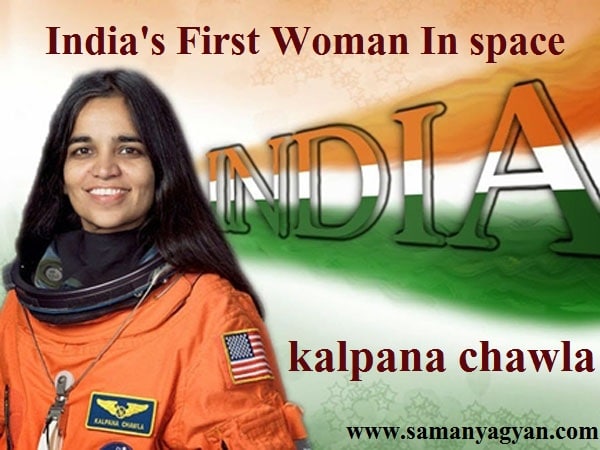Through this chapter, we will know important and interesting facts related to Kalpana Chawla such as his personal information, education and career, achievements and honored awards and many more. Important facts related to Kalpana Chawla given in this topic have been collected, which will help you in preparing for competitive exams.
Kalpana Chawla Quick General Knowledge
| Name | Kalpana Chawla (Kalpana Chawla) |
| Date of Birth | 17 July 1962 |
| Birth Place | Karnal, Haryana (India) |
| Date of death | 01 February 2003 |
| Monther & Father Name | Sanjayoti / Mr. Banarsi Lal Chawla |
| Achievement | 1994 - The first woman of Indian origin to go into space. |
| Profession / Country | Female / Astronaut / India |
Kalpana Chawla - The first woman of Indian origin to go into space. (1994)
Kalpana Chawla was an Indian-American astronaut and an expert on space shuttle missions. He was born in Karnal in the Indian state of Haryana. She was the first woman in India who flew in space. She was a woman from India who had high spirits and good intentions. She had dreams of flying in space since her childhood, which she later completed created a history and became the first woman in India to fly in space.
In 1988, she began working at the NASA Ames Research Center, in 1993, she joined Oversett President, as vice president and research scientist specializing in simulations to solve many body problems. Chawla practiced certified flight instructor for single and multi-engined airplanes, seaplanes and gliders for airplanes, gliders and commercial pilot licenses. After becoming a naturalized US citizen in April 1991, Chawla applied for NASA's Astronaut Corps. She joined Vahini in March 1995 and was selected for her first flight in 1996. His first space mission began on November 19, 1997, as part of a six-astronaut crew that flew the space shuttle Columbia flight STS-87. Chawla was the first Indian woman to fly in space.
During his journey into space weightlessness, he uttered the following words, "You are just your intelligence." On his first mission, Chawla traveled 10.4 million miles (16737177.6 km) in 252 orbits of Earth, which enters space over 372 hours (15 days and 12 hours). During STS-87, she was responsible for deploying the Spartan Satellite, which required a spacewalk by Winston Scott and Takao Doi to capture the satellite. A five-month NASA investigation completely eliminated Chawla by identifying flaws in the software interfaces and defined procedures of flight crew and ground control. After completion of the STS-87 post-flight activities, Chawla was appointed to technical positions in the astronaut office to work on the space station.
In 2001, Kalpana Chawla was selected for her second flight as part of the crew of the STS-107. The mission was repeatedly delayed due to scheduling conflicts and technical problems such as the discovery of cracks in shuttle engine flow liners in July 2002. On January 16, 2003, Chawla finally returned to the space shuttle Columbia on an STS-107 mission in space. The crew conducted approximately 80 experiments studying Earth and space science, advanced technology development and astronaut health and safety. During the launch of STS-107, Columbia's 28th mission, a piece of fok insulation detached from the outer tank of the space shuttle and fell on the orbiter's left-wing.
The fourteenth contracted Northrop Grumman Cygnus spacecraft mission was then named "SS Kalpana Chawla" to deliver supplies to the ISS. The satellite, "MetSAT-1", launched by India on September 12, 2002, was renamed "Kalpana-1". 74th Street in "Little India" of Jackson Heights, Queens, New York City, New York, the United States has been named "Kalpana Chawla Way" in her honor. The Kalpana Chawla Award was instituted in 2004 by the Government of Karnataka to recognize young women scientists. NASA has dedicated a supercomputer to Chawla. One of the Florida Institute of Technology's student apartment complexes, Columbia Village Suites, has halls named after every astronaut, including Chawla.
The Kalpana Chawla ISU Scholarship Fund was established in 2010 by alumni of the International Space University (ISU) to support the participation of Indian women in international space education programs. The Kalpana Chawla Memorial Scholarship Program was established by the Students Association of India (ISA) at the University of Texas at El Paso (UTEP) in 2005 for meritorious undergraduate students. The Kalpana Chawla Memorial Scholarship Program was established by the Students Association of India (ISA) at the University of Texas at El Paso (UTEP) in 2005 for meritorious undergraduate students. Kalpana Chawla Outstanding recent alumni quiz at the University of Colorado, given since 1983, was renamed after Chawla.
Kalpana Chawla Hall, University of Texas Arlington In addition, the University dedicated the Kalpana Chawla Memorial on 03 May, 2010, at Nederman Hall, one of the primary buildings in the College of Engineering. The University of Texas at Arlington, where Chawla received a Master of Science degree in aerospace engineering in 1984, opened a hostel in 2004 called Kalpana Chawla Hall. The girls' hostel in Punjab Engineering College is named after Chawla. In addition, an award of INR twenty-five thousand, a medal, and a certificate has been instituted for the best student in the Department of Aeronautical Engineering. The Haryana government established the Kalpana Chawla Planetarium at Jyotisar in Kurukshetra. Indian Institute of Technology, Kharagpur named Kalpana Chawla Space Technology Cell in her honor. Kalpana Chawla Government Medical College (KCGMC) is a medical college located in Karnal, Haryana, India.
Kalpana Chawla FAQs:
Kalpana Chawla is to be known as the The first woman of Indian origin to go into space. in 1994.
Kalpana Chawla died on 01 February 2003.
Kalpana Chawla father name was Mr. Banarsi Lal Chawla.
Kalpana Chawla mother name was Sanjayoti.

